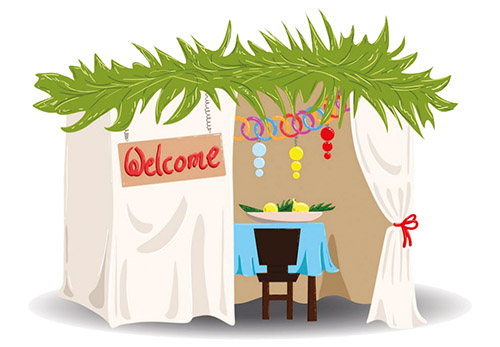
My grandmother is often asked by her grandchildren, even as adults, “Am I your favorite? I must be your favorite.” She always responds, “You are my favorite! My favorite is the grandchild who I am spending time with right now!” I can’t help but feel the same way about the chagim, each Yom Tov that comes, I think to myself, I can’t wait, this is my favorite, I am looking forward to enjoying this specific aspect of the chag. With Sukkos only a few days away, and with the blessing of celebrating Sukkos in Los Angeles each year, I really am looking forward to sitting in the sukkah next week.
Each year my father poses the question to young and old at his table, why do we sit in the sukkah on Sukkos? And each year he begins by sharing a humorous anecdote from the Babat Shteibel where a congregant responded to this question, “Rebbe, when should we sit in the sukkah if not on Sukkos?! On Pesach?”
This question is raised by many mefarshim, who debate if we are commemorating the sukkah mamash, the actual, physical tents we lived in the desert, or the ananei hakavod, the clouds of glory, the metaphorical sukkah, through which God protected us during our 40 year sojourn in the desert.
The Netivot Shalom takes the question a step further, and asks why is it that we have an entire holiday commemorating the clouds of glory, which is one of three miracles we were blessed with in the desert, but none for the be’er Miryam, the well, or the manna that fell six days a week and sustained us in the desert. An explanation that resonated with me in the past, is that water and food are basic, fundamental needs. God took us out of Egypt and into the desert, and therefore it was a must for Him to provide a means for food and water. The clouds of glory though, were a true gift, demonstrating His love for us. It wasn’t something He needed to give to us. He showed us his love with the ananei hakavod, it carried the young and weak, and protected us from inclement weather and our enemies.
The Netivot Shalom provides another explanation. Our holidays commemorate “inyanim nitzchiyim,” or things that are eternal, and are thus established l’dorot, for generations. The distinguishing quality between the miracle of ananei hakavod, versus the well and the manna, is that the miracle of God’s protection via the ananei hakavod, is eternal, while the well (water supply) and the manna (food), were miracles that were exclusively for the generation of the midbar.
This is the essence of Sukkos: “Lema’an yed’u doroteichem ki vasukkot hoshavti et Bnei Yisrael be’hotzi’i otam me’eretz Mitzrayim; ani Hashem Elokeichem,” So that your future generations will know that I made the children of Israel dwell in booths when I took them out of the land of Egypt; I am the Lord your God” (Vayikra 23:43). This is the fundamental core of our belief in God—that the Protector of Israel never rests or sleeps. God’s hashgacha over us is constant and perpetual.
So, why do we sit in the sukkah on Sukkos? By sitting in the sukkah on Sukkos we are remembering and demonstrating that we know, deep within us, that God is our eternal Protector, not just in the midbar when we left Egypt thousands of years ago, but also in the metaphorical midbar. Lema’an yed’u doroteichem—we understand that the protection of the ananei hakavod, is still with us today, in every situation, in all times, God watches over His people with a special hashgacha.
Wishing you a chag kasher v’sameach.
Alanna Apfel is the founder and patient advocate at AA Insurance Advocacy, which helps therapy patients, individuals, couples, and children, save thousands of dollars annually on their out of network mental health therapy bills. In the months that AA Insurance Advocacy has been advocating on behalf of patients, clients have collected anywhere from $5,000 to $45,000 a year in reimbursements, depending on the cost and frequency of therapy. If your preferred therapist doesn’t take your health insurance, we can help negotiate with your plan to cover your out-of-pocket therapy costs. For further information, please contact [email protected].













